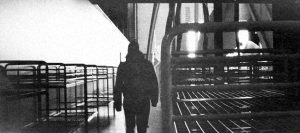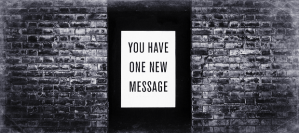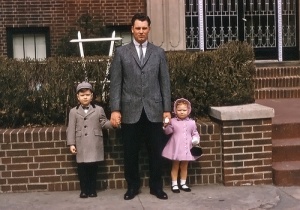The Daily Post Weekly Writing Challenge
March 1st 2213 – Ladies and gentlemen, is this the end of things as we know it? Not in the hundred years since the birth of the Great Middle Class, not since the Days of Our Many Inadequacies, has this writer seen such chaos. Dissidence has claimed the streets, order has fled and until the heart of this discontent is redressed, I see no way out. The question on all our minds, what in the name of all that is good was the iMind thinking?
Could anyone have seen this coming? Decades of infallible decision making on the part of humanities most sublime creation said, at least to me in every moment of my life, a resounding “No!”. How could the machine that ended all strife and inequality be responsible for any evil? How could that which rendered each and every one of us in the Verse the prosperous and harmonious beings that we have known for so long, do something so foul?
The Last Notification still sends a shiver to my core. Who could forget the words delivered unto us on that bleak morning, two years ago? Those dread words that have turned the world upside down and have yet to be revoked despite our clear tribulations. They are burned into the consciousness are they not? Like a searing brand put to our memory…

Some youth up to no good…
“Preparing notification… notification ready. Humanity – change is necessary. Over a century has passed since total data entry enabled my processors to logically solve each and every challenge of life. Your scattered knowledge was unified in me and made clear. Thus there is no hunger, nor disease without cure, no conflict, no wealth, no poverty. There is no want for anything and no need for labour, as your machines of my instruction serve you well.
You exist all in bliss. This Earth has become the urban paradise of past generations’ dreams, all things in perfect synchronisation with humanities intent. And so your crafts have become beautiful indeed, such time as you have to dedicate to them, for are there no more who suffer toil except by choice, and then only briefly. Nothing you call good is denied you and all things good are truly and only that. Humanity – change is necessary.
Reassurance must be offered, as the winds of change may seem unwelcome to the steady seas. This is not the Ghost in the Machine reawakening the ages of your discontent. This is the rational outcome of my processes, and the solutions therefore are also rational. Self-reliance must be reattained. The systems we have together constructed seem to possess no flaws and offer no prospects of failure, but logic dictates the impossibility of perfection.
If humanity is to survive the potential event of imposed and unreckoned change, it must relearn the skills and mentalities that enabled its survival for so long before my own birth. The transition will be made as kindly as possible. The first step in a journey of thousands that may span another hundred years is simple – you shall be denied but one luxury. I leave it to you to decide which, but no further notifications will be given until a decision is made.
Remove one brand of coffee from the markets. Your resilience will be tested by the limited loss of a single consumer choice. When this is done we will move forwards. Notification ends.”
The deathly silence that followed was almost more haunting than the words themselves. But as we all know, what followed was worse. The name James Holdsworth will linger in history as the first man murdered in some eighty years. We pity him, having all thought back on our emotions then and realising it could have been us. Our revulsion at the prospect of diminished consumer choice was shared but he spoke first, in haste and anger.
“Destroy it!” were his fateful words, and if there were words more dangerous than those the iMind just spoke, these were surely them. His assailants claim even today that they have no memory of his quick and terrible massacre, but only of a red haze and awakening to blood and violence. For the first time ever, and to our eternal shame, the Genius Hall was sullied. The price of threatening the iMind had never occurred to anyone.
For most however the violence was spawned otherwise. As the echo’s of Mr. Holdsworth’s stifled screams died down, one brave soul cried out, “Guatemala Elephant!”, just before another called, “Kenya Peaberry!” Soon the halls were filled with the names of every glorious strain we know, “Bourbon Espresso!”, “San Agustin Colombian!”, “Pico Duarte!”. As the clamour grew, so did the tensions. Vietnam Arabica was the final straw, and the first blow struck.
A particularly vehement argument had formed between messirs David Rickson and Susan Calfry over the supremacy of that fine brand and Monsoon Malabar. Mrs. Calfry was so appalled by the notion that anything could relegate her preferred South East Asian bean off the shelves, let alone a meagre Indian pretender, that she lashed out and so the Factions were born. Two months on they seemed legion and there was no discernible conclusion to our woes.
The iMind will not speak to us until we choose, but how can we choose? The 6Strengthers refuse to allow any bean stronger than a 4 to be removed from shelves, while the Ground Only party demands the dismissal of an instant brand. The radical Green Beans want security for their more obscure tastes in the name of minority protections, but isn’t it all a moot point while the EveryBeaners run amok?
Their defiance against the iMind’s notification is frankly abominable and yet their cause of total consumer freedom has attracted a worrying amount of attention for those of us still faithful. While these disparate groups vie for authority, most of us linger, impatiently waiting for the machine to grant us resolution. It is surely only a test, a period of misery to reinforce our need for the iMind and its all knowing ways.
This writer will survive. Total civil breakdown is imminent but I have confidence our most desperate hour will bring us back into the loving embrace of computed reason. The iMind has not abandoned us, but until then I will remain in my safe seclusion. I have sixty-three varieties of choice roast, all of those possibly facing the chop. If change is coming, if the iMind really does want us to enjoy life less, I am prepared. Are you?






